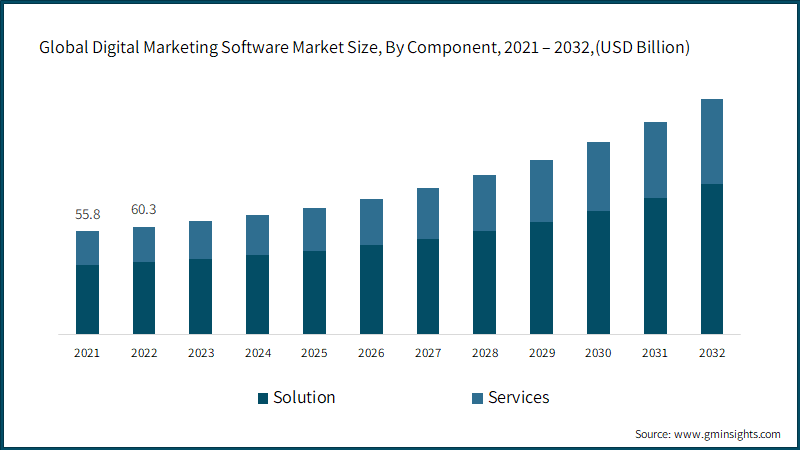Home > Media & Technology > Media and Entertainment > Advertising > Digital Market
Digital Marketing Software Market Analysis
- Report ID: GMI6784
- Published Date: Sep 2023
- Report Format: PDF
Digital Marketing Software Market Analysis
The software segment held over 65% of the digital marketing software market share in 2022, owing to its pivotal role in driving modern marketing strategies. For instance, in September 2023, FADEL, an innovator of brand compliance, rights management, and royalty billing software, enhanced its Brand Vision – Content Tracking solution, designed to monitor content compliance across various online platforms. This functionality aids marketers in maintaining brand consistency and legal compliance. Such tools support brand management, ensuring content alignment across digital channels, improving marketing efficiency and proliferating the demand for software solutions offering content tracking and management capabilities.
This segment includes various software tools and platforms that empower marketers to plan, execute, and analyze their campaigns effectively. With the increasing complexity of digital marketing efforts, businesses are investing heavily in advanced software solutions including analytics, automation, and content management systems to gain a competitive edge and optimize their marketing endeavors, thereby contributing to segment growth.

The cloud-based segment recorded around 40% of the digital marketing software market share in 2022, as businesses embrace the advantages of cloud technology. Cloud-based solutions offer scalability, flexibility, and cost-efficiency, making them an attractive choice for modern marketers. With the ability to access marketing tools and data from anywhere, companies can streamline their operations and improve collaboration among remote teams. Moreover, cloud-based platforms ensure regular updates and enhancements, adding the latest trends and technologies to marketing software and further increasing their adoption in the market.

North America digital marketing software market accounted for 30% of revenue share in 2022. The region’s strong economy, high internet penetration, and tech-savvy population create a favorable environment for digital marketing adoption. For instance, in June 2023, Salesforce introduced Marketing GPT and Commerce GPT, leveraging generative AI for enhanced advertising and shopping experiences. These tools can generate creative content and assist in personalizing marketing campaigns.
In the digital marketing software market, such AI-driven innovations can empower marketers to create more engaging and customized content, leading to improved customer engagement and potentially boosting the demand for advanced marketing software solutions. Additionally, the presence of numerous established businesses and a thriving startup ecosystem augments the demand for sophisticated marketing solutions.

